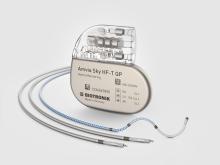The Effects of Air Pollution on Heart Health
Higher quality of life, more biodiversity and a better climate – the advantages of green cities seem obvious. Green living – including breathing clean air – plays an especially crucial role for our heart health and overall well-being. On the occasion of World Environment Day, we looked at what effect air pollution has on heart health and what each of us can do to make our cities more livable.

The Scientific Data Is Clear
According to the World Heart Federation, air pollution is a major contributor to global disease burden, accounting for about 12 percent of all deaths worldwide in 2019. While the negative effects of air pollution on respiratory health are well known, air pollution also has a substantial impact on cardiovascular health. It can increase the risk of heart attacks, strokes, ventricular arrhythmogenesis, myocardial infarction and associated ventricular fibrillation, and cardiac arrest and is therefore a key risk factor for cardiovascular disease.
In a recent joint statement, the World Heart Federation, American College of Cardiology, American Heart Association, and the European Society of Cardiology highlighted clinical evidence illustrating the devastating effects air pollution can have on cardiovascular health. Globally, nearly 20 percent of cardiovascular disease deaths were attributable to air pollution. In recent years, research has specifically looked at the impact of air pollutants such as particulate matter (PM), ozone, and nitrogen dioxide (NO2) on heart health. The scientific evidence is most consistent for PM, which is responsible for the vast majority of pollution’s cardiovascular disease burden.1,2,3 The European Society of Cardiology published an expert position paper with updated evidence that, identified air pollution as a major modifiable risk factor to consider in cardiovascular disease prevention and management.
Air pollution’s effects on cardiac patients are also particularly problematic as a recent study suggests. The scientific paper published by study author Dr. Alessia Zanni and colleagues evaluated the influence air pollution has on patients with implantable cardioverter defibrillators (ICD). According to their research, life-threatening arrhythmias are more common on days with highly polluted air. Patients at high risk of ventricular arrhythmias, such as those with an ICD, should therefore check daily pollution levels.
What Can You Do to Reduce Your Health Risks?
There are easy steps that each and everyone of us can take to reduce the exposure to air pollution in our daily lives. The British Heart Foundation and the National Heart Foundation of Australia recommend the following measures:
- If air pollution levels are too high, stay indoors to limit your exposure. There are useful online tools that provide information on daily levels of air pollution worldwide.
- Air quality inside vehicles is poorer. Therefore, walk or cycle whenever possible instead of driving. As a bonus, this is also helpful in reducing traffic-related air pollution.
- While walking bike commuting or exercising, stay away from congested roads or industrial sites. If this is not possible, try to avoid the rush hour by leaving late or early.
- To improve air quality indoors, opt for electric or gas for cooking and heating as opposed to burning wood or coal.
- Freshen indoor air quality by opening your windows a few times a day and/or using portable air purifiers when possible.
- Do not smoke indoors and avoid secondhand smoke exposure.
- Last but not least, eat a healthy and balanced diet rich in fruit and vegetables and take additional preventive measures to help promote your overall heart health.
How Can We Improve Local Air Quality?
We can all contribute to making our world greener and improving local air quality. The best advice is to re-think your mode of transportation – whenever possible walk, cycle, or use public transportation or car sharing options. This can help to reduce the number of vehicles on the road releasing fumes and it’ll keep you physically active. Also, if you’re thinking about buying a car, consider a petrol, hybrid, or an electric car instead of a diesel car. Also, try monitoring how much electricity your household uses and conserve energy.
We at BIOTRONIK are committed to an environmentally sustainable business approach. The sustainable use of our natural resources and our commitment to environmental protection is of the highest importance to us. Therefore, we contribute to the preservation of the environment for future generations by continuously improving our environmental performance and carbon footprint. We conserve natural resources through the conscious selection of materials and services for our products, as well as through environmentally and climate-friendly behavior. We also support local bike to work initiatives such as the Stadtradeln campaign. Learn more about us in our “Inside BIOTRONIK” section of our corporate blog.
References:
* According to information provided by the World Health Organisation.
1. Brook RD, Rajagopalan S, Pope CA 3rd , et al. Particulate matter air pollution and cardiovascular disease: An update to the scientific statement from the American Heart Association. Circulation 2010;121:2331–2378.
2. Newby DE, Mannucci PM, Tell GS , et al. Expert position paper on air pollution and cardiovascular disease. Eur Heart J 2015;36:83–93. https://academic.oup.com/eurheartj/article-lookup/doi/10.1093/eurheartj… (5 August 2019).
3. Rajagopalan S, Al-Kindi SG, Brook RD. Air pollution and cardiovascular disease: JACC State-of-the-Art Review. J Am Coll Cardiol 2018;72: 2054–2070.













